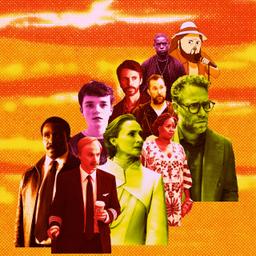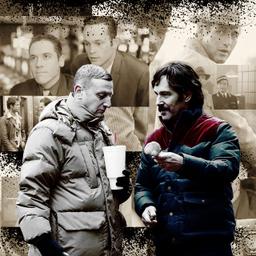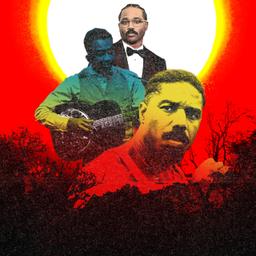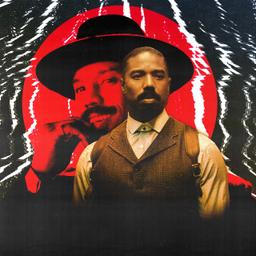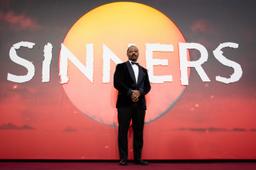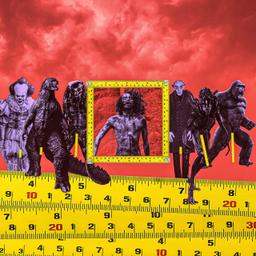Last summer, the big story of my halfway-mark honor roll was horror, elevated and otherwise: movies anxiously mapping our public and private twilight zones. Things are still plenty scary in 2025, but for my money, the smartest filmmakers are the ones using genre elastically, to stretch our ideas about fear to and past their breaking points. For example: The Shrouds is a comedy, and Friendship is a horror movie (and they’re both about app developers). What the best films of the year so far share is a tone of quiet, creeping uncertainty; they’re riddled with images wide open to interpretation and endings that leave loose ends dangling all over the place. This nagging sense of incompletion is all the more reason to consider my picks provisional—or maybe as a cliff-hanger before the impending award-season stampede brings us one auteur project after another. But before worrying about December, let’s see which titles made the list six months in.
10. The Woman in the Yard
Where last year’s Netflix Christmas present Carry-On was slick and lightweight, Jaume Collet-Serra’s follow-up manifests as grim, gripping psychological horror—not so much elevated by the director’s typically fluid staging as inhabited. Danielle Deadwyler is terrific as a widow trying to protect her children from an apparent intruder clad in a long black veil, but, as it turns out, the proverbial call is coming from outside the house. The fact that it’s easy to guess the intentions and identity of the titular woman in the yard doesn’t make the creeping, inexorable nature of the threat any less unsettling. Collet-Serra’s control of the frame is total and, working with Ari Aster’s usual cinematographer, Pawel Pogorzelski, he conjures up some of the most indelible supernatural imagery in recent memory—shadowplay and suggestion worthy of Val Lewton.
9. The Phoenician Scheme
Don’t call it a comeback—or a departure. Wes Anderson is as Wes Anderson does. Still, there’s something to be said for surface variations, especially when they’re deployed as precisely and suggestively as in The Phoenician Scheme, which qualifies as its maker’s first official globe-trotting action movie and offers more pleasure than its immediate predecessors in the Anderson canon. The film is beautifully made, of course, but it’s also got soul; casting the ever-hangdog Benicio Del Toro as a morally dubious captain of midcentury international industry is inspired, and he gives a performance that’s exactly as soulful as the material needs to avoid archness. This is Anderson’s best storytelling in a while: He plots his antihero a wonderfully bumpy redemptive arc, including a couple of spectacular crash-outs. Meanwhile, the actors around Del Toro do the live-action cartoon thing with aplomb; Michael Cera’s ace supporting turn suggests he should visit WesWorld more often. Supposedly, Del Toro’s character was based on Anderson’s late father-in-law, and the affection running through the film is palpable without dulling the edges of its capitalist critique. In imagining the actions of a power broker attempting to ethically divest himself of his ill-gotten fortune—and with it, his sins—Anderson has his Trump-era allegory and skewers it too.
8. Friendship
I’ve heard complaints here and there that Andrew DeYoung’s debut feature doesn’t establish a plausible behavioral baseline for its characters, or that it’s hard to fully reconcile the abject desperation of Tim Robinson’s hapless, friendless Craig with the reactions of the people around him. I say that this tension is not a bug, but a feature, and also what makes Friendship bolder and stickier than the majority of cozy, post-Apatow bromances. Intimacy makes weirdos of us all, and DeYoung conveys the sensation ably in between belly laughs; the fact that so many of the funniest moments feel spontaneous—not so much ad-libbed as beamed in from another dimension—belies the tightness of the screenwriting. For all its goofiness, Friendship is a supremely lucid piece of work; its subtext hews closer to the hallucinatory consumerist-critique of Fight Club than the dudes-rock-absolution of I Love You, Man, and it’s brave enough to see its ideas about loyalty, trust, and beta-male resentment through to their (il)logical conclusions. For Your Consideration: Best Supporting Actor, Paul Rudd, gleefully liberated from the Marvel gulag and killing it in a part carefully tailored to his star persona. Best Supporting Supporting Actor: Conner O’Malley, who shows up for one scene and gets the line reading of the year (you’ll know it when you hear it).
7. Misericordia
You can’t go home again—and if you do, there will be blood. That’s the upshot of Alain Guiraudie’s delightful and disturbing Misericordia, about a wayward 20-something named Jérémie (Félix Kysyl), who returns to the rural village of his youth for a funeral and tries to relive his (nicoise) salad days, with unfortunate results. Everywhere Jérémie looks, he sees romantic possibilities—his alpha-male childhood playmate; a pudgy, tender loner; the local priest—some of whom are wedged further into their proverbial closet than others. Our hero is also harboring darker impulses, however, and Guirardie has a good old time building suspense in the same languid, neo-Hitchcockian style that defined his great 2013 thriller Stranger by the Lake. Beneath his careful craft, Guiraudie is a satirist and a humanist. He’s interested in what makes his characters tick, and also why they go haywire. The more metaphysical Misericordia gets, the more its jagged, jabbing style draws blood. It’s a dark, gorgeously morbid movie that understands the link—at once religious and instinctual—between guilt and desire. Watching it is as harrowing and compulsively fascinating as eavesdropping on somebody else’s confessional.
6. Sinners
Fittingly for a movie featuring twin protagonists, Sinners embraces bifurcation: the first half is a vibrant community portrait, the second a John Carpenter–style siege thriller. The connective tissue between these sections is musical, stretching toward and away from a show-stopping, mind-melting centerpiece juxtaposing multiple genres and generations of African American artistry. Ryan Coogler isn’t just leaving it all on the dance floor here; he’s brushing up against the edges of big-budget studio filmmaking and dragging a pretty big mainstream audience along for the ride. Remember all the weirdly pointed industry-press skepticism about whether Sinners would ever recoup his budget? $350 million (and counting) later, Coogler looks like the smartest guy in the room—even more so because he has no interest in making a sequel. Good for him: Who needs blockbuster horror franchises anyway?
5. Eephus
There is, famously, no crying in baseball. Carson Lund’s feature debut is nevertheless designed to leave a certain kind of viewer misty-eyed. Basically, if you’ve ever driven down to a local diamond to stretch it out, shag flies, and shoot the shit with your buddies—the more middle-aged and dad-bodied, the better—Eephus is for you. Even compared to classics like The Bad News Bears and Bull Durham, the stakes are low, baseball-wise: the players are affable rec-leaguers gathered for one last game in a long-standing rivalry based around bragging rights. The real opponent is urban development: the teams are staring down the impending demolition of their beloved ballpark and, also, the encroaching truth of their collective mortality. This is seventh-inning-stretch existentialism, complete with a Hall of Fame ringer in Bill “Spaceman” Lee, who beams in to play a version of himself. Lund is a crafty filmmaker: he knows how to work the count and paint the corners, and his art-house influences are in order (whoever first made the Goodbye, Dragon Inning joke deserves royalties). By turns somber and scrappy—and as carefully paced and framed as a perfect game—Eephus is the sports movie of the year: low-budget American filmmaking of a high order.
4. On Becoming a Guinea Fowl
Zambian Welsh director Rungano Nyoni’s superb sophomore feature opens with an incongruous nod to Missy Elliott. Driving home through Lusaka from a costume party in Supa Dupa Fly drag, Shula (Susan Chardy) comes across the dead body of her uncle, who’s apparently expired outside a local brothel, where he was a regular customer. Susan’s sparkly getup makes her look like an astronaut, or maybe a time traveler; with this in mind, the dead man’s funeral—an elaborate affair involving dozens of cousins and waves of ritualized catharsis—ends up serving as a conduit to childhood trauma. It’s a wormhole that, as it turns out, is accessible by other female members of the family; Shula’s ambivalence about the not-so-dearly-departed and his displays of avuncular affection are part of a larger pattern. The question of how we memorialize abusers—by either calling them out, or rationalizing their actions, or posthumously sweeping their dirt under the rug—is at the heart of On Becoming a Guinea Fowl, which is funnier than its subject matter suggests. It’s a movie about speaking up that announces an eloquent directorial voice; Nyoni’s roving camera navigates fractious family dynamics—and the rickety, interlacing architectures of guilt and grief—so agilely that even the heaviest moments feel weightless.
3. 28 Years Later
OK, forget what I said at the end of the Sinners blurb: it turns out that blockbuster horror franchises aren’t a problem if you have a few good madmen at the helm. Let’s give it up to Danny Boyle, Alex Garland, and (especially) Anthony Dod Mantle for making 28 Years Later miles better than anybody could have expected: a visually stunning, thematically sophisticated exercise in world-building that doubles as a withering (if empathetic) critique of Britain’s “splendid isolation,” past, present, and future. For all the carefully wrought continuity with its predecessors, 28 Years Later is distinguished by images that reach beyond them: a chase across a waterlogged causeway beneath the Northern Lights dredges up primal fears from deep in the collective subconscious, while an extended idyll in a mythic, handmade mausoleum scales the heights of emotional, expressive, comic-book pulp. As for the much-discussed coda, which slyly weaponizes UK pop culture, it’s crazy, alright—like a fox.
2. Caught by the Tides
Arguably the greatest Asian filmmaker of the 21st century, Jia Zhangke, takes a trip down memory card lane, repurposing two decades’ worth of old footage (some of it shot behind the scenes) for an all-new narrative about the growing pains of the Chinese Century. While not a horror movie, Caught By the Tides is nevertheless haunted by the specter of Jia’s previous work, including, and especially, Unknown Pleasures, Still Life, and Ash Is Purest White (all of which are worth catching up with before taking the plunge). Jia loves slight, spacious plotlines and his favorite structure is girl-loses-boy, girl-chases-boy-across-the-country. What makes the structure work here is that his eternal leading lady-slash-life-partner Zhao Tao is so good at conveying yearning—for a lost lover, for her own fading dreams—that she doesn’t have to say a word. Her silence speaks volumes in Caught By the Tides; in a witty touch, her dialogue is delivered almost entirely via text messages, deployed in the style of silent-movie intertitles in order to collapse a century’s worth of cinematic history. Everything old is new again; throw in some glancing references to COVID-19 lockdowns and a bit of sci-fi-imagery with a smiling consumer-friendly AI (a close encounter of the Spielbergian kind), and Caught By the Tides reveals itself as something special: a movie of the moment 20 years in the making.
1. The Shrouds
Among its many virtues as a late-style auteur piece (long live the old flesh!) and wicked tech-bro satire (dig all that sarcastic Tesla product placement), The Shrouds is also the most Hitchcockian movie of David Cronenberg’s long career. Thinking about the spirals of desire linking Vincent Cassel’s GraveTech CEO Karsh to the women in his life—his late wife, Becca; her twin sister, Terry; and his yassified girl-Friday AI assistant, Hunny, all sultry blondes played by Diane Kruger—could give even the most firmly grounded viewer a case of Vertigo. Perverse romance, of course, is one of Cronenberg’s sweet spots—and so is paranoid conspiracy. The genius of The Shrouds is how it threads the needle between grief and anxiety, suturing them together with the surgical precision of a mad scientist. It’s the cinematic equivalent of an exquisite corpse.

